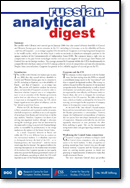Russia, Central Asia and the Shanghai Co-operation Organization

Author(s): Oksana Antonenko
Editor(s): Matthias Neumann, Robert Orttung, Jeronim Perovic, Heiko Pleines, Hans-Henning Schröder
Series: Russian Analytical Digest (RAD)
Issue: 25
Pages: 7-12
Publisher(s): Center for Security Studies (CSS), ETH Zurich; Research Centre for East European Studies, University of Bremen
Publication Year: 2007
